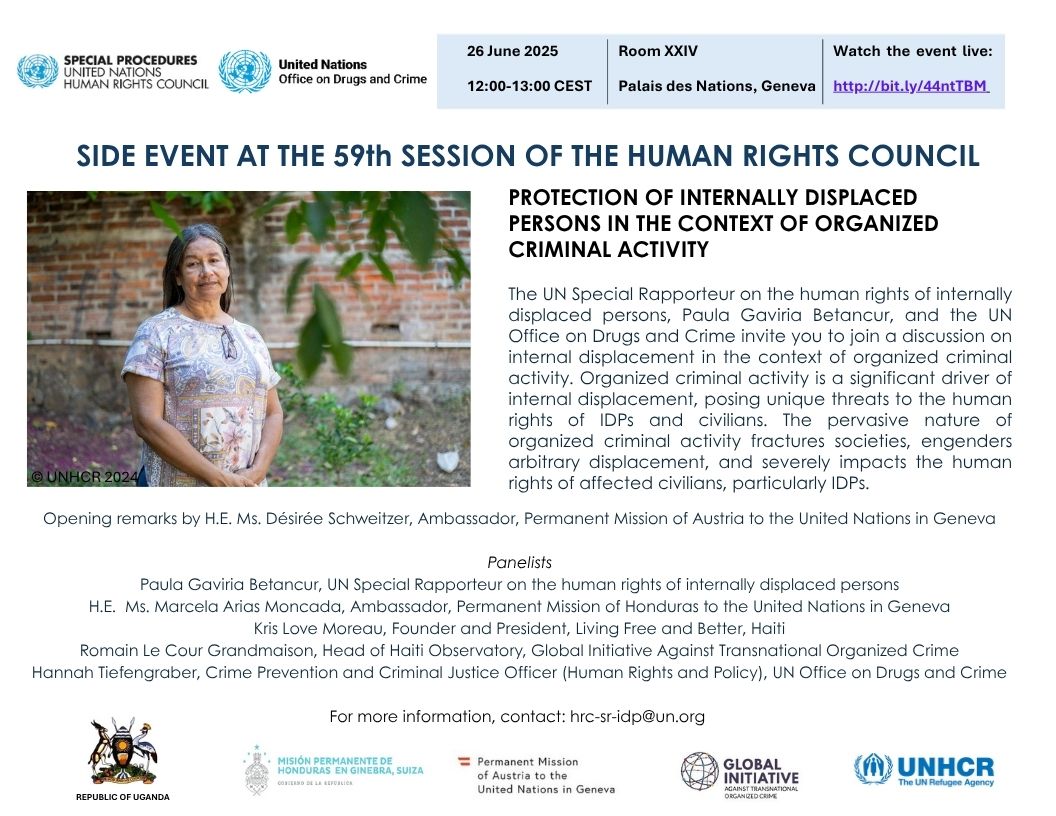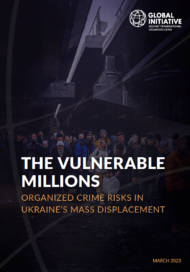Posted on 16 Jul 2025
Alongside the UN Special Rapporteur on the human rights of internally displaced persons, Paula Gaviria Betancur, the Global Initiative Against Transnational Organized Crime (GI-TOC) was honored to co-organize and participate in the side event titled “Protection of Internally Displaced Persons in the Context of Organized Criminal Activity,” held during the 59th Session of the UN Human Rights Council in Geneva, at the Palais des Nations, on 26 June 2025.
Co-organizers included the UN Special Rapporteur on the human rights of internally displaced persons, the UN Office on Drugs and Crime, and GI-TOC. The event was co-sponsored by the Permanent Missions of Austria, Honduras, and Uganda to the United Nations in Geneva, as well as by the UN High Commissioner for Refugees (UNHCR).
This side event followed the presentation of the Thematic Report of the Special Rapporteur on the Human Rights of Internally Displaced Persons, by the UN Special Rapporteur. The side event marked a significant milestone in advancing the international conversation on displacement driven by organized criminal activity—a phenomenon that continues to expand across various global regions but remains insufficiently addressed in normative and policy frameworks.

Key takeaways from the Thematic Report of the Special Rapporteur on the Human Rights of Internally Displaced Persons
Organized criminal activity is an increasingly significant and underrecognized driver of internal displacement worldwide. By the end of 2024, it is estimated that at least 1.2 million individuals had been displaced due to criminal violence—a figure that has doubled since 2023 and likely underrepresents the true scale of the phenomenon, owing to limited national data collection. In many affected contexts, violence is not incidental but instrumental, deployed systematically by criminal groups to assert control over territory, populations, and illicit economies.
Internally displaced persons (IDPs) affected by organized crime frequently endure severe and protracted violations of their human rights, including killings, torture, sexual violence, forced labour, and recruitment. These abuses are often perpetrated not only by criminal actors but also with the acquiescence—or active participation—of State agents. Responses to such displacement have too often been militarized and security-focused, aggravating harm to civilians and undermining protection objectives.
This issue transcends singular legal frameworks and reveals critical gaps at the intersection of international human rights, humanitarian, and criminal law. It also intersects with other drivers of displacement such as armed conflict, environmental disasters, and climate change. Despite some promising national initiatives, the global response remains inadequate. A more coherent, coordinated, and rights-based approach is urgently required.
Key Recommendations from the Thematic Report
The report articulates a comprehensive response along four central pillars: Prevention, Protection, Accountability and Access to Justice, and Durable Solutions.
- Prevention
- Recognize displacement caused by organized crime as a distinct protection issue, requiring tailored legal and policy frameworks.
- Collect and analyze disaggregated data to inform evidence-based interventions.
- Strengthen State institutions and invest in equitable local development to reduce communities’ vulnerability.
- Promote youth employment and support youth-led initiatives to mitigate recruitment into criminal groups.
- Establish early warning mechanisms and property rights registries.
- Apply human rights-based approaches to policing and law enforcement.
- Protection
- Avoid militarized responses; prioritize civilian protection in all security operations.
- Establish clear humanitarian protocols to ensure uninterrupted essential services during crises.
- Address the specific protection needs of marginalized and at-risk groups, including women, children, and LGBTQ+ persons.
- Strengthen anti-trafficking mechanisms and support awareness-raising initiatives.
- Empower community-based protection networks, particularly those led by or inclusive of IDPs.
- Accountability, Access to Justice, and Remedy
- Promote trauma-informed, victim-centred justice systems that acknowledge the experiences of displaced persons.
- Empower local authorities and ensure the meaningful participation of affected populations in decision-making processes.
- Ensure accountability for criminal actors and complicit State officials. Transparency and justice are critical to restoring public trust.
- Durable Solutions
- Establish reintegration pathways for individuals formerly associated with criminal groups.
- Guarantee access to housing, land, and property restitution mechanisms.
- Promote reconciliation, social cohesion, and community-led reconstruction efforts, including access to psychosocial support.
The report affirms the primary responsibility of States to protect and assist IDPs but also emphasizes the importance of a whole-of-society approach. National human rights institutions, civil society actors, international organizations, and the United Nations system must enhance cooperation and coordination with States to develop effective, rights-based responses to displacement driven by organized criminal activity.
A quote from the Special Rapporteur, Paula Gaviria Betancur:
“Violence derived from criminal activity fractures communities, erodes the trust in the State and between the people, and breaks profoundly the social fabric. It often leads to the criminalization of victims themselves and internally displaced persons. In this context, it is urgent to tackle poverty, provide access to public services and address the weak rule of law. While states bear their primary responsibility to protect and assist displaced persons, the rise of powerful criminal organizations often reflects the States’ inability or, sometimes, unwillingness to uphold the rule of law. Too often States’ responses rely heavily on militarized crackdowns, and this can worsen displacement. This can also perpetuate violence and alienate the very people they are meant to protect. So instead, I urged in the report a rights-based, comprehensive approach that centers on prevention, on protection, on participation and on durable solutions for the internally displaced and communities.”
Key Takeaways from the Geneva side-event
Convened in parallel to the presentation of the Special Rapporteur’s thematic report on this issue, the event brought together Member States, international organizations, civil society, and academic experts to exchange policy-relevant insights and recommendations. The discussion emphasized:
- The distinct vulnerabilities of IDPs in criminalized contexts, particularly women, children, and youth, who are disproportionately affected by coercion, sexual violence, and forced recruitment.
- The multiplicity of displacement drivers, including weak state governance, militarization, environmental degradation, illicit economies, and systemic corruption.
- Institutional and legal mandate gaps, which prevent coherent and effective protection strategies, particularly when responses remain overly securitized and disconnected from root causes.
- The imperative of community-led, rights-based responses, reinforcing the role of local actors, particularly women and youth, in advancing protection and justice.
- The structural political economy of violence, highlighting the involvement of private sector actors in land dispossession, forced evictions, and extractive practices that increase exposure to displacement and exploitation.
- Climate change as a threat multiplier, accelerating displacement and deepening vulnerabilities exploited by criminal actors.
GI-TOC Presentation at the Side Event on Haiti
During the side event, Romain Le Cour Grandmaison, Head of the Haiti Observatory at GI-TOC, delivered a presentation on the political economy of violence and displacement in Haiti.
Haiti is currently experiencing a protracted and deepening security, political, and humanitarian crisis—now in its third consecutive year. The magnitude of the crisis is severe: several humanitarian indicators are comparable to those seen in active civil conflicts, and Haiti’s homicide rates rank among the highest in the Latin America and Caribbean region.
According to the most recent data from the International Organization for Migration (IOM), nearly 1.3 million people—approximately 11% of the country’s population—are now internally displaced, marking a 24% increase since January 2025.
Crucially, displacement in Haiti cannot be viewed as an incidental consequence of insecurity. Rather, it constitutes a deliberate strategy of armed criminal governance, employed to assert territorial control, displace rivals, and fragment resistance. This form of displacement represents an acute violation of human rights and requires recognition as such by the international community.
The Haitian case compels us to widen our conceptual and operational lens. It demands that we acknowledge how criminal networks actively shape conflict and humanitarian dynamics, and that we adapt our protection and response strategies accordingly.
GI-TOC emphasizes the need to move beyond siloed responses. A durable approach to the Haitian crisis requires coordinated engagement among political, humanitarian, development, and security actors, grounded in a shared understanding of how organized crime operates and the violations it engenders—including forced displacement.
📘 Read our latest Brief on the internal displacement crisis in Haiti here: [Upcoming]
GI-TOC Recommendations
As noted in our intervention, GI-TOC welcomes the increasing recognition of organized criminal activity as a major driver of internal displacement. However, acknowledgment must be matched by action. We call for:
- A review and strengthening of protection mandates to encompass the realities of criminal violence.
- The integration of displacement dynamics into responses to organized crime and vice versa.
- Greater investment in data, analysis, and evidence to inform protection strategies that are fit for purpose.
- Mechanisms to ensure accountability, justice, and access to durable solutions for all displaced persons.
Further GI-TOC Reading
- Haiti Observatory – [Haiti IDPs – GI-TOC Brief (forthcoming)]
- Latin America Observatory – Displaced by Organized Crime: Unseen and Forgotten
- Ukraine Observatory – The Vulnerable Millions: Organized Crime Risks in Ukraine’s Mass Displacement
For more information about our work on organized crime and displacement, please contact: info@globalinitiative.net



